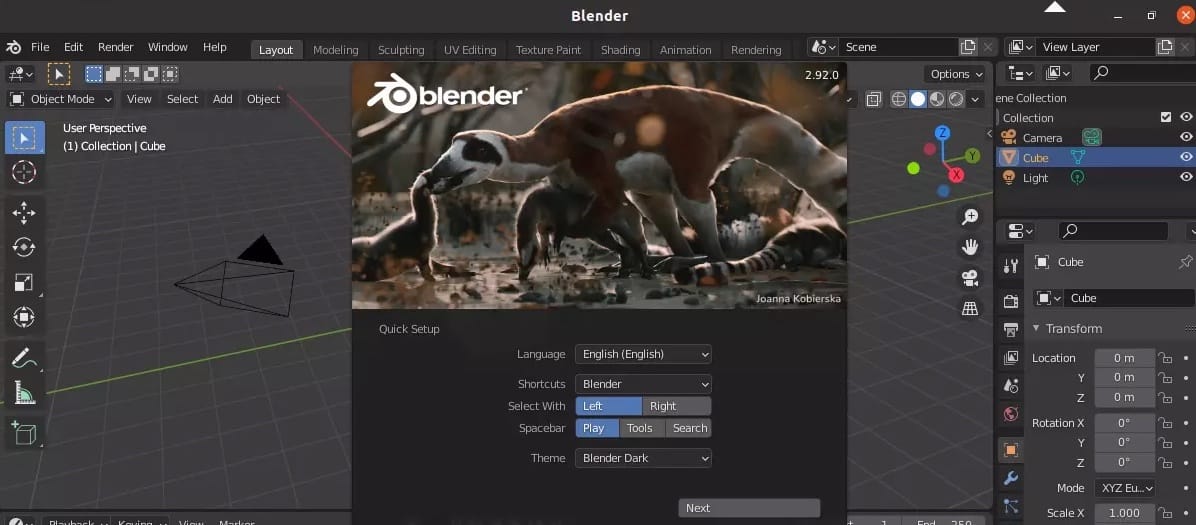How To Install Blender on Ubuntu 24.04 LTS

Blender is a feature-rich, open-source 3D creation suite that offers a wide range of tools for 3D modeling, animation, rendering, compositing, and even video editing. Its powerful and flexible toolset makes it suitable for a variety of projects, from creating simple 3D models to complex animations and visual effects. Blender’s open-source nature has fostered a vibrant community of developers and artists who contribute to its development and provide support through forums, tutorials, and resources. The software’s cross-platform compatibility allows users to work on their projects seamlessly across different operating systems, including Windows, macOS, and Linux distributions like Ubuntu 24.04 LTS.
In this comprehensive guide, we will explore different methods to install Blender on Ubuntu 24.04 LTS, providing step-by-step instructions and troubleshooting tips to help you get started with this versatile 3D software.
Prerequisites
- A server running one of the following operating systems: Ubuntu and any other Debian-based distribution like Linux Mint.
- It’s recommended that you use a fresh OS install to prevent any potential issues.
- Basic familiarity with the terminal and command-line interface.
- SSH access to the server (or just open Terminal if you’re on a desktop).
- Processor: 64-bit dual-core CPU with SSE2 support.
- Memory: 8 GB RAM or higher.
- Graphics: OpenGL 3.3 compatible graphics card with 2 GB RAM.
- Storage: 2 GB of free disk space for installation and additional space for projects.
- An active internet connection. You’ll need an internet connection to download the necessary packages and dependencies.
- An Ubuntu 24.04 system with root access or a user with sudo privileges.
Install Blender on Ubuntu 24.04
Step 1. Updating the Package Repository.
Keeping your system up-to-date is a fundamental best practice in Linux system administration. Before installing any new software, it’s crucial to ensure that all existing packages are current. This step helps prevent potential conflicts and ensures compatibility with the latest security patches. To update your system, open a terminal and run the following commands:
sudo apt update sudo apt upgrade
The first command refreshes the package lists, while the second upgrades all installed packages to their latest versions. You may be prompted to confirm the upgrades; if so, type ‘Y’ and press Enter to proceed.
Step 2. Installing Blender.
- Installing Blender via Ubuntu Software Center
The Ubuntu Software Center provides a user-friendly way to install Blender on Ubuntu 24.04 LTS. Follow these steps to install Blender using the Software Center:
-
- Open the Ubuntu Software Center by clicking on the Ubuntu icon in the top-left corner of your screen and searching for “Ubuntu Software.”
- In the Ubuntu Software Center, use the search bar to search for “Blender.”
- Click on the Blender entry in the search results to open its details page.
- Click on the “Install” button to begin the installation process.
- If prompted, enter your user password to authorize the installation.
- Wait for the installation to complete. The Software Center will display a progress bar and notify you when the installation is finished.
Once the installation is complete, you can launch Blender from the Applications menu or by searching for it in the Activities overview.
- Installing Blender via Terminal
For users who prefer the command line or want more control over the installation process, installing Blender via the Terminal using the APT package manager is a straightforward method. Follow these steps to install Blender using the Terminal:
sudo apt install blender
Wait for the installation to complete. The Terminal will display the progress and notify you when the installation is finished.
After the installation is complete, you can launch Blender from the Applications menu or by typing blender in the Terminal and pressing Enter.
- Installing Blender via Snap
Snap is a containerized package format that offers automatic updates and isolation for applications. Installing Blender using Snap ensures that it runs in a sandboxed environment and receives updates automatically. Follow these steps to install Blender using Snap:
sudo snap install blender --classic
Wait for the installation to complete. The Terminal will display the progress and notify you when the installation is finished.
Once the installation is complete, you can launch Blender from the Applications menu or by typing blender in the Terminal and pressing Enter. Snap will automatically keep Blender updated to the latest version.
- Installing Blender via Flatpak
Flatpak is another containerized package format that provides sandboxing and easy installation for applications. To install Blender using Flatpak, follow these steps:
Install the Flatpak package manager by running the following command:
sudo apt install flatpak
Add the Flathub repository, which hosts a wide range of Flatpak applications, including Blender:
flatpak remote-add --if-not-exists flathub https://flathub.org/repo/flathub.flatpakrepo
Install Blender using Flatpak with the following command:
flatpak install flathub org.blender.Blender
Wait for the installation to complete. Flatpak will download and install the necessary dependencies and notify you when the installation is finished.
After the installation is complete, you can launch Blender from the Applications menu or by running the following command in the Terminal:
flatpak run org.blender.Blender

Congratulations! You have successfully installed Blender. Thanks for using this tutorial for installing the Blender open-source 3D creation suite on the Ubuntu 24.04 LTS system. For additional help or useful information, we recommend you check the official Blender website.